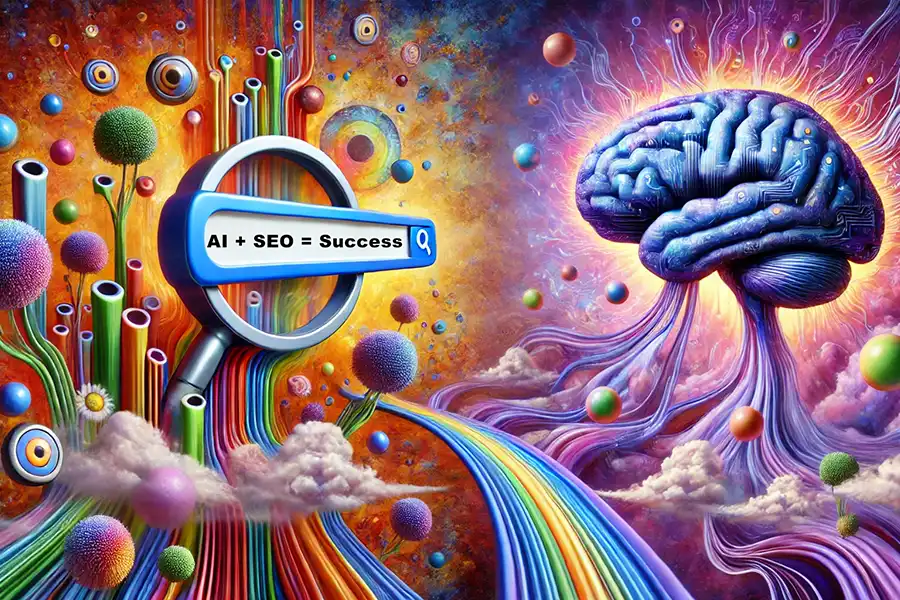Learn How AI is Changing the SEO Landscape

Artificial Intelligence (AI) is revolutionizing various industries, and SEO is no exception. With the integration of AI technologies, search engines like Google have transformed the way websites are ranked and content is surfaced to users. Understanding how AI impacts SEO is critical for marketers and businesses aiming to maintain or improve their search engine visibility.
AI's Role in Search Algorithms
Google has increasingly integrated AI into its search algorithms, with updates like RankBrain, BERT (Bidirectional Encoder Representations from Transformers), and MUM (Multitask Unified Model) that improve the search engine's understanding of language and intent. These algorithms leverage machine learning to better comprehend the nuances of human language, allowing search engines to deliver more accurate and context-aware results.
For example, Google's RankBrain uses AI to analyze a query and match it with the most relevant search results, even if it's a query the search engine has never encountered before. BERT helps Google understand the context of words in a sentence, while MUM can process multiple forms of content (text, images, videos) in different languages, taking search capabilities to new heights.
Marketers must focus on providing comprehensive, contextually relevant content to adapt to these advances, as AI now prioritizes content that better answers user queries rather than merely relying on keyword density or backlinks.
AI-Powered Content Creation
AI is not only transforming how search engines rank content but also how content is created. Tools like OpenAI's GPT-4 and Google's AI-based content solutions enable marketers to generate SEO-optimized content faster and with greater ease. These AI tools assist in topic research, content structuring, and even writing entire articles, saving time while ensuring consistency in quality.
However, as AI-generated content becomes more prevalent, it is essential to differentiate high-quality, original content from generic outputs. Search engines like Google are developing systems to detect low-quality AI-generated content and penalize it. This means that businesses need to use AI tools wisely, ensuring human oversight and creative input to maintain the authenticity and value of their content.
Enhanced User Experience and Search Intent Optimization
With AI's deep learning models, search engines are better equipped to understand the searcher's intent and deliver content that aligns with their needs. This goes beyond just matching keywords to queries-it involves interpreting the user's intent behind the search and offering personalized results based on their behavior and preferences.
For example, Google's AI algorithms now consider user behavior signals such as click-through rates, dwell time, and engagement to determine the relevance of content. Websites that focus on delivering a superior user experience-by offering fast load times, intuitive navigation, and mobile optimization-are likely to rank higher as AI assesses more than just keyword relevance.
AI in Voice Search and Natural Language Processing (NLP)
The rise of voice search, powered by AI-driven natural language processing (NLP), has brought significant changes to SEO strategies. With the growing use of voice assistants like Google Assistant, Alexa, and Siri, searches are becoming more conversational and question-based. This shift requires content creators to focus on long-tail keywords and question-based queries, often targeting featured snippets or "position zero."
According to Google's developer documentation, voice search optimization will play a critical role in future SEO strategies. AI-driven NLP technologies help search engines understand and process conversational queries better, which is why structured data and clear, concise answers are becoming vital for SEO success.
AI and Search Visibility: A New Era for SEO
The integration of AI into SEO is also reshaping how marketers think about search visibility. As outlined by Search Engine Land, traditional SEO tactics like link building, keyword stuffing, or even manual backlinking are no longer as effective. Instead, marketers must focus on content relevance, user engagement, and semantic SEO strategies. AI-driven tools now play a significant role in helping brands analyze their competitors, identify trending topics, and optimize their websites in ways that were previously time-consuming or difficult.
The shift toward AI in search visibility emphasizes the importance of creating content that answers the user's questions comprehensively and clearly, while also taking into account the design and structure of the website for a seamless user experience.
AI is undeniably changing the SEO landscape, offering new opportunities for content optimization and user engagement while also raising the stakes for content quality and relevance. Businesses that embrace AI technologies in their SEO strategies, while maintaining human oversight, are likely to see better results in search visibility and organic rankings. As AI continues to evolve, staying updated on these changes and understanding how to leverage AI-driven tools will be essential for staying competitive in the ever-shifting SEO environment.
